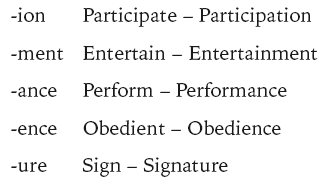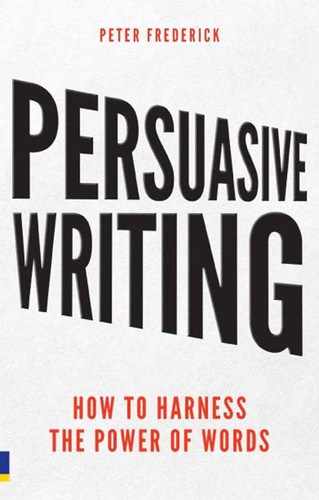Verbs Equal Vigour
The verb is the workhorse of any sentence. Without a verb, nouns would just sit around doing nothing. Adjectives may be able to tell you how wonderful the noun is, but it’s still sitting on its backside (actually, it’s not even doing that, as ‘to sit’ is a verb). Chuck in a verb, however, and your sentence is jumping, skipping, singing, dancing and even racing across the page (or just sitting on its backside . . .).
This section will look at:
- names of words – a grammar refresher;
- activating passive verbs;
- freeing nominalised nouns.
Remember – if following a rule makes your writing less persuasive, break it.
GRAMMAR REFRESHER
If your only contact with grammar is when you visit her in the care home, this is the section for you.
When I started looking into this, I found there was a lot of grammar. Books full of it. Too much of it, in fact. I’ve broken most of it in the last few sentences as well. Which goes to show, to write persuasively, you don’t need lots of rules. In order to explain the text below, however, we need to review some basic word types:
Noun – names a person, object, place or idea/feeling.
Examples: Professor Plum, candlestick, billiard room, murder.1
Pronoun – word that replaces a noun or partners a noun to show possession.
Examples: it, them, they, mine, theirs, ours.
Adjective – adds information on the features of a noun or pronoun – answers the questions “what kind?”, “which one?”, “how many?”, or “how much?”.
Examples: studious Professor Plum, heavy candlestick, dark billiard room, brutal murder.
Verb – describes an action or state of being. Note: the verb ‘to be’ is not descriptive and so requires adverbs to create action.
Examples: run, skip, play, follow, chase, shoot, bore, annoy.
Adverb – adds information on how, when, where, or to what extent the verb performs.
Examples: run quickly, skip nearby, play tomorrow, follow closely.
VERBS JUST WANNA HAVE FUN
Verbs are all about action and energy. By choosing the right sentence structure, you give more energy to your verbs and they in turn will give more energy to your writing. Before we get on to the advice, however, we need just a bit more background grammar.
Sentences are made up of a subject, a verb and, usually, an object. The subject of a sentence is the ‘who’ or ‘what’ the verb relates to. For example:

The person or ‘thing’ that performs the action described by the verb is called the agent. In the example above, Jenny is both the subject and the agent in the sentence, i.e. she is the one who tripped and the one who performed the action of tripping. Where a sentence is arranged agent – verb – object (as above), it is said to use the active voice. Generally, sentences read better if they are in this order. This is because the reader likes to find out:
Who did what to whom (“the salmon leapt into the air”)
rather than:
What had something done to it by whom (“the air was leapt into by the salmon”).
You can hear how clumsy that sounds if you read it out loud.
In the second example above, the subject of the sentence (the air) is not the agent (which is the salmon). Where a sentence is arranged subject – verb – agent, it is said to use the passive voice.
Although this sounds a bit complex, there are some easy ways to spot the use of the passive and active voices. Passive sentences use variants of the verb ‘to be’ (is being, was, will be, etc.) and also tend to have the word ‘by’.
Rule 18: favour the active voice wherever possible
Example:

If the agent is not present, you may need to add it:

It may be harder to spot passive verbs in longer phrases:

Sometimes, the passive voice is useful and so there are exceptions to this rule. Use the passive voice when:
- the emphasis needs to be on the object (“A fire was started by a gang of youths”);
- you don’t know who the subject is (“A man was murdered yesterday”);
- you don’t want your subject to take responsibility (“All staff are expected to work overtime”);
- the writing style dictates it (e.g. academic papers).
However, if your text doesn’t require one of the exemptions, activate your verbs and let them have fun.
VERBS IN DISGUISE – NOUN SUFFIXES
There’s nothing crueller than to suppress a verb. A nominalised noun is a verb that has been imprisoned within a noun. They can usually be spotted by the addition of the following endings:

Examples:
“We would appreciate your signature on the contract” becomes:
“Please sign the contract”.
“Jane’s performance was poor” becomes: “Jane performed poorly”.
“The implementation of changes is the divisional manager’s responsibility” becomes:
“Implementing the changes is the divisional manager’s responsibility”
Or, even better:
“The divisional manager is responsible for making changes”.
In some cases, verbs can sound harsh and nominalised nouns can help soften the impact (e.g. “we would appreciate your assistance” is much gentler than “please help”). However, in doing this, they suck energy from the sentence. Which statement would a charity use in an advert, for example? Set your verbs free and your reader will thank you.
SUMMARY
- Verbs give life to your writing and should be used wherever possible.
- Arrange sentences Agent – Verb – Object to use the active voice.
- Arrange sentences Subject – Verb – Agent to use the passive voice.
- Favour the active voice unless you are sure it’s not appropriate.
- Try to convert nominalised nouns back to their original verbs.
- Remember – a piece of writing is there to do a job: In most cases correct grammar improves clarity and keeps the reader happy but don’t be afraid to bend the rules if it makes your writing more persuasive.
1 Murder is both a noun and a verb: “He committed murder” (noun) or “He murdered her” (verb).
